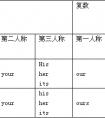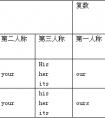句型转换。1.I have breakfast at school at seven o'clock. (把I换成we) _____ _____breakfast at school at seven o'clock. 2.We play basketball on Monday mornin-七年级英语
我昨天给他打电话,问他我下周干什么。
比较:
"What shall I do next week?" I asked.
"我下周干什么?"我问道。(可以说,shall变成直接引语时,变成了should。)
2)would也无词义,是will的过去形式,与动词原形构成过去将来时,用于第二、第三人称,例如:
He said he would come.他说他要来。
比较:
"I will go," he said. 他说:"我要去那儿。"
变成间接引语,就成了:
He said he would come.
原来的will变成would,go变成了come.。过去式从原来的go变为came。
be, do,have,他们没有词汇意义,只有语法作用,如协助构成进行体,完成体,被动态,否定句,疑问句等。
例如:
He is giving a lecture. 他在作报告
He has made a plan. 他已经订了计划
The small animals are kept in the cages. 小动物都关在笼子里。
助动词协助主要动词完成以下功用:
a. 表示时态,例如:
He is singing. 他在唱歌。
He has got married. 他已结婚。
b. 表示语态,例如:
He was sent to England. 他被派往英国。
c. 构成疑问句,例如:
Do you like college life? 你喜欢大学生活吗?
Did you study English before you came here? 你来这儿之前学过英语吗?
d. 与否定副词not合用,构成否定句,例如:
I don't like him. 我不喜欢他。
e. 加强语气,例如:
Do come to the party tomorrow evening. 明天晚上一定来参加晚会。
He did know that. 他的确知道那件事。
考点名称:并列连词
- 并列连词:
主要是用来表示并列关系、选择关系、因果推理关系等。也可用来连接平行的词,词组或分句。 并列连词表示关系及代表实例:
1.表示并列关系
表示并列关系的连词主要含有“和”、“补充”、“增加”等意思。用来表达并列关系的连词有如下几个:
and 和 both...and...二者都
either...or...或者...或者...
neither...nor...既不...也不...
as well as 也、连同
not only...but (also)... 不但...而且...
e.g.
I used to live in Paris and London.
我过去住在伦敦和巴黎。
Both Jane and Jim are interested in pop music.
詹妮和吉姆对流行音乐都很感兴趣。
She is not only kind but also honest.
她不但和蔼而且诚实。
Bob as well as his parents is going on holiday this summer.
鲍勃和他的父母今年夏天要去度假。
2.表示转折关系
常用来表示转折关系的并列连词有如下几个:
but 但是
yet 然而
still 仍然
while 然而
while 然而、偏偏
e.g.
The winter in Beijing is very cold while that of Kunming is warm.
北京的冬天很冷,然而昆明的冬天却很温暖。
I explained twice, still he counldn't understand.
我解释了两遍,然而他却还不懂。
3.表示选择关系
表示选择关系的并列连词:
or 或者
or else 否则
otherwise 否则
neither...nor... 既不...也不...
either...or... 或者...或者...
e.g.
Would you like leave or would you like to stay?
你是想走还是想留?
You can come either on Saturday or on Sunday.
你可以星期六来也可以星期天来。
Neither you nor I nor anyone else believes such things.
不管你我或者其他任何人都不会相信这件事。
4.表示因果推理关系
表示因果关系的并列连词主要有so,for,then,therefore 等。
e.g.
The air here is polluted, so the crops are dying.
这里的空气受到了污染,所以庄稼快死了。
The leaves of the trees are falling, for it's already autumn.
树叶在落下,因为秋天已经到来了。- 并列连词注意事项:
并列连词for引导的分句只能放在句尾,前面用逗号隔开,表示补充说明的微弱理由,只是为前面的内容提供判断的理由,有时译为并列的某种形式。
这与because不同,because引导的是一种明确的因果关系,解释原因,常可回答why的提问。 - 几个特殊并列连词用法:
一、表示并列关系的and,or,well,as,not only...but also... 等连词也有比较活跃的用法。
and 作为并列连词有多重含义,除了可以表示并列关系外,还可以表示顺承、目的、条件、反复等关系。
e.g:He went to market and bought some vegetables.(表示顺承,动作的先后发生)
他到市场买了一些蔬菜。
Come and help me out.(表示目的)
过来帮我一下。
Be careful and you'll make fewer mistakes.(表示条件)
如果仔细,你所犯的错就少。
二、or 与 either...or...
or表示为“否则”的话,前句一般是祈使句,后句用一般将来时。
在表示选择关系时or 与 either...or... 用法相同,但 either...or...更具强调性。
在多个对象进行选择时,可以用A or B or C... , either A or B or C... , neither A or B or C... 。
e.g:Either Jim or Jake or Jeff knows about this.
三、as well as 与not only... but also...
名词+as well as+名词作主语时,强调前面的名词,谓语动词要根据前面的名词而定。
not only...but also...连接名词作主语时,其强调在后者,谓语动词要根据后面的名词而定。
e.g:China as well as many other countries loves peace.
中国与世界上的其他许多国家一样热爱和平。
Not only Bill but also his parents want to go traveling by bike.
不仅比尔而且他的父母都想骑自行车去旅游。
注:当or,neither...nor...,either...or 等连接主语时,谓语动词由or或nor后面的部分而定。 - 并列连词表示关系:
种类
用法
举例
并列连词
表示转折关系
but, yet等
表示因果关系
For, so等
表示并列关系
And, or, either…or,
neither…nor, not only..
but also, as well as等
考点名称:特殊疑问句
- 特殊疑问句:
以特殊疑问词开头,对句中某一成分提问的句子叫特殊疑问句。
常用的疑问词有:what、who、whose、which、when、where、how、why等。
特殊疑问句的基本结构是“疑问词+一般疑问句”。
其回答应当是具体的。特殊疑问句句末一般用降调。
例如:How do I get there?
Why not?
What about the sports news? - 常用疑问词可先分为3种:
疑问代词:
what(什么)
who(谁,作主语)
which(哪个,在一定范围内选择)
whose(谁的,指附属关系)
whom(谁,作宾语)
疑问副词:
when(何时,询问时间)
where(何地,询问地点)
why(为什么,询问原因)
how(如何,询问手段,方式,工具以及程度)
疑问形容词:
what(which,whose)+名词
例词:
what time(什么时候) what colour(什么颜色)... ...
how much(多少) how long(多长)... - 特殊疑问句的特点:
一、 特殊的疑问词:
特殊疑问句要由疑问代词或疑问副词开头,询问的内容不同, 使用的疑问词也不同。
我们学过的疑问词有what(询问事物), how much(询问价格), what time (询问时间,尤其是点钟), what kind of(询问种类), why(询问原因),who(询问人), where(询问地点) 等等。如:
—What is this? 这是什么?
—It's a key. 这是一把钥匙。
—How much is it? 这个多少钱?
—It's twenty dollars. 二十美元。
—What kind of movies do you like? 你喜欢哪一类型的电影?
—I like action movies. 我喜欢动作片。
- 最新内容
- 相关内容
- 网友推荐
- 图文推荐
| [家长教育] 孩子为什么会和父母感情疏离? (2019-07-14) |
| [教师分享] 给远方姐姐的一封信 (2018-11-07) |
| [教师分享] 伸缩门 (2018-11-07) |
| [教师分享] 回家乡 (2018-11-07) |
| [教师分享] 是风味也是人间 (2018-11-07) |
| [教师分享] 一句格言的启示 (2018-11-07) |
| [教师分享] 无规矩不成方圆 (2018-11-07) |
| [教师分享] 第十届全国教育名家论坛有感(二) (2018-11-07) |
| [教师分享] 贪玩的小狗 (2018-11-07) |
| [教师分享] 未命名文章 (2018-11-07) |

![Can you tellyour name?[ ]A. I B. meC. my D. mine-七年级英语](http://www.00-edu.com/d/file/ks/4/2/renchengdaici/2019-11-29/smallaa364e43e5a60c14a303f4c0130566e11575032405.png)


![_____ a cat. _____ name's Mimi. [ ]A. It's, It's B. Its, It's C. It's, ItsD. Its, Its -七年级英语](http://www.00-edu.com/d/file/ks/4/2/renchengdaici/2019-11-29/small3d77ed9f3a276fbdbe50d7d083528cb11575029994.jpg)
![Pu Cunxin is a good film star (电影明星). _____ is tall and he _____small eyes.[ ]A. His; hasB. He; hasC. He; isD. His; is-七年级英语](http://www.00-edu.com/d/file/ks/4/2/renchengdaici/2019-11-29/small1be6e01031d0d1da1dc8d9521925f3de1575032118.png)
